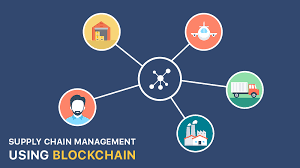Introduction:
The logistics and supply chain management industry is critical to the functioning of the global economy. It involves managing the movement of goods and services from the point of origin to the point of consumption. With the increasing complexity of supply chains, it has become essential to leverage innovative technologies that can enhance efficiency, reduce costs and improve transparency. Blockchain technology is one such technology that has gained significant traction in recent years. In this article, we will explore the role of blockchain technology in logistics and supply chain management.
What is Blockchain Technology?
Blockchain technology is a decentralized, distributed ledger that records transactions on a network of computers. It enables secure, transparent, and tamper-proof transactions without the need for intermediaries. Each block in the chain contains a cryptographic hash of the previous block, timestamp, and transaction data. Once a block is added to the chain, it cannot be modified, providing a high level of security and transparency.

Enhancing Transparency and Traceability in Supply Chain Management:
The supply chain management industry involves multiple parties, including suppliers, manufacturers, distributors, retailers, and customers. Blockchain technology provides a transparent and secure platform to track the movement of goods and services across the entire supply chain. Each transaction is recorded on the blockchain, and all parties involved in the supply chain can access and verify the information. This enables better traceability, reduces the risk of fraud, and enhances the overall efficiency of the supply chain.
Streamlining Logistics Operations:
Logistics operations involve the management of transportation, storage, and distribution of goods and services. Blockchain technology can help streamline these operations by providing real-time visibility into the movement of goods. This enables logistics companies to optimize their routes, reduce delivery times, and improve customer satisfaction. Furthermore, blockchain technology can also automate the documentation process, reducing paperwork and enhancing the overall efficiency of logistics operations.

Reducing Costs and Improving Efficiency:
The logistics and supply chain management industry is complex, involving multiple parties, transactions, and documentation. Blockchain technology can help reduce costs and improve efficiency by eliminating the need for intermediaries, such as banks and brokers. It provides a secure and transparent platform for parties to transact without the need for a third party. This not only reduces costs but also enhances the overall efficiency of the supply chain.
Blockchain technology has the potential to revolutionize the logistics and supply chain management industry. It provides a secure and transparent platform for parties to transact, reduces costs, and improves efficiency. Furthermore, it enhances transparency and traceability, streamlines logistics operations, and enables real-time visibility into the movement of goods. As the technology continues to evolve, we can expect to see more applications of blockchain technology in the logistics and supply chain management industry.
Blockchain technology has already started transforming the logistics and supply chain management industry. The technology has been embraced by several companies, including Maersk, Walmart, and UPS, to name a few.
Maersk, the world’s largest container shipping company, has implemented a blockchain-based platform called Trade Lens. The platform aims to streamline the documentation process, reduce fraud, and enhance the overall efficiency of the supply chain. It provides a single source of truth for all parties involved in the supply chain, enabling real-time visibility into the movement of goods.

Walmart, one of the largest retailers in the world, has also implemented a blockchain-based platform for food safety. The platform enables the tracking of the origin of food products, reducing the risk of foodborne illnesses and enhancing transparency.
UPS, a global logistics company, has partnered with blockchain technology provider Inxeption to launch a platform that enables businesses to manage their supply chains more efficiently. The platform provides real-time visibility into the movement of goods, simplifies the documentation process, and enhances the overall efficiency of logistics operations.
The adoption of blockchain technology in the logistics and supply chain management industry is still in its early stages. However, as more companies embrace the technology, we can expect to see significant improvements in efficiency, transparency, and cost reduction. The technology has the potential to transform the entire supply chain management industry, from the way goods are transported and stored to the way transactions are conducted.
However, there are also challenges that need to be addressed before blockchain technology can be fully adopted in the logistics and supply chain management industry. The first challenge is the lack of standardization. Currently, there is no standard way of implementing blockchain technology in the industry. This makes it challenging for companies to integrate the technology seamlessly into their operations.
The second challenge is scalability. Blockchain technology is still in its early stages, and it can be slow and inefficient when dealing with large volumes of data. This can be a significant challenge for logistics and supply chain management companies that deal with a massive amount of data.
Lastly, the issue of security needs to be addressed. While blockchain technology is secure, there is still a risk of hacking and cyberattacks. This can compromise the integrity of the supply chain and lead to significant losses.
In addition to the challenges mentioned earlier, there are also other potential drawbacks of implementing blockchain technology in logistics and supply chain management. One such drawback is the cost. While blockchain technology can help reduce costs by eliminating intermediaries, the cost of implementing and maintaining the technology can be significant. Small and medium-sized enterprises (SMEs) may find it challenging to bear the cost of implementing blockchain technology.

Another potential drawback is the need for collaboration. Blockchain technology requires all parties involved in the supply chain to collaborate and agree on the implementation of the technology. This can be a significant challenge, especially when dealing with complex supply chains involving multiple parties.
Despite these challenges, the benefits of implementing blockchain technology in logistics and supply chain management are significant. The technology can help reduce costs, improve efficiency, and enhance transparency and traceability. Furthermore, it can help reduce the risk of fraud and errors, enhance the security of the supply chain, and enable real-time visibility into the movement of goods.
Conclusion
Blockchain technology has the potential to transform the logistics and supply chain management industry by improving efficiency, transparency, and accountability. While there are challenges that need to be addressed, the benefits of implementing the technology are significant. As more companies embrace the technology, we can expect to see significant improvements in the efficiency and transparency of the supply chain management industry, leading to greater customer satisfaction, reduced costs, and increased profitability.



